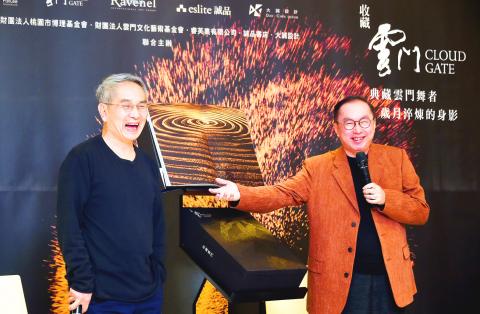Quanta Cloud Technology (QCT, 雲達), Quanta Computer Inc’s (廣達) datacenter solution subsidiary, yesterday forecast sales would keep growing by a double-digit percentage next year on robust datacenter demand from hyperscale Internet service providers (ISP) and non-hyperscale enterprise clients.
“We are optimistic about next year. The outlook is very promising,” QCT president Mike Yang (楊晴華) told reporters on the sidelines of the annual meeting of the Cloud Computing & IoT Association in Taiwan.
Quanta set up its cloud computing business in 2004 and established QCT in 2007. QCT’s datacenter solutions include server, storage, switch and rack systems, and other cloud solutions. Facebook Inc, Alphabet Inc’s Google and Microsoft Corp are on the company’s client list.

Photo: Hu Shun-hsiang, Taipei Times
QCT has set up production bases in the US, Europe, China and Japan, Yang said.
Revenue from the cloud computing business contributed 30 percent to Quanta’s sales of NT$276.18 billion (US$9.2 billion) last quarter, company data showed.
The cloud computing business includes revenue from QCT and Quanta’s wearable devices, as the company considers those an application of cloud-computing technology.
Demand for cloud computing infrastructure from hyperscale ISPs, such as Facebook, would continue to expand strongly next year, Yang said, adding that QCT also saw surging demand from non-hyperscale clients in the past year.
Non-hyperscale enterprise clients are chiefly companies whose resources and scale of operations are smaller than Google or Facebook, but also require heavy cloud computing infrastructure, as they collect large amounts of specific data, such as Uber Technologies Inc and Spotify AB.
QCT did not pay much attention to non-hyperscale clients in the past few years, but they would become a growth catalyst for the company in the coming years, Yang said, declining to disclose any names.
Yang said that international telecoms’ increasing orders as they build edge computing infrastructure — in which data is processed close to the source than at the center of the network — would also support QCT’s operations.
QCT is to expand production capacity at its production bases in San Jose, California and Dusseldorf, Germany, next year to meet rising demand, he said.
In related news, Quanta yesterday said its revenue grew 2.3 percent annually to NT$94.71 billion last month, bringing its cumulative revenue for the first 11 months to NT$934.64 billion, up 18.46 percent from NT$789.02 billion over the same period last year.

Nvidia Corp chief executive officer Jensen Huang (黃仁勳) on Monday introduced the company’s latest supercomputer platform, featuring six new chips made by Taiwan Semiconductor Manufacturing Co (TSMC, 台積電), saying that it is now “in full production.” “If Vera Rubin is going to be in time for this year, it must be in production by now, and so, today I can tell you that Vera Rubin is in full production,” Huang said during his keynote speech at CES in Las Vegas. The rollout of six concurrent chips for Vera Rubin — the company’s next-generation artificial intelligence (AI) computing platform — marks a strategic

REVENUE PERFORMANCE: Cloud and network products, and electronic components saw strong increases, while smart consumer electronics and computing products fell Hon Hai Precision Industry Co (鴻海精密) yesterday posted 26.51 percent quarterly growth in revenue for last quarter to NT$2.6 trillion (US$82.44 billion), the strongest on record for the period and above expectations, but the company forecast a slight revenue dip this quarter due to seasonal factors. On an annual basis, revenue last quarter grew 22.07 percent, the company said. Analysts on average estimated about NT$2.4 trillion increase. Hon Hai, which assembles servers for Nvidia Corp and iPhones for Apple Inc, is expanding its capacity in the US, adding artificial intelligence (AI) server production in Wisconsin and Texas, where it operates established campuses. This

US President Donald Trump on Friday blocked US photonics firm HieFo Corp’s US$3 million acquisition of assets in New Jersey-based aerospace and defense specialist Emcore Corp, citing national security and China-related concerns. In an order released by the White House, Trump said HieFo was “controlled by a citizen of the People’s Republic of China” and that its 2024 acquisition of Emcore’s businesses led the US president to believe that it might “take action that threatens to impair the national security of the United States.” The order did not name the person or detail Trump’s concerns. “The Transaction is hereby prohibited,”

Garment maker Makalot Industrial Co (聚陽) yesterday reported lower-than-expected fourth-quarter revenue of NT$7.93 billion (US$251.44 million), down 9.48 percent from NT$8.76 billion a year earlier. On a quarterly basis, revenue fell 10.83 percent from NT$8.89 billion, company data showed. The figure was also lower than market expectations of NT$8.05 billion, according to data compiled by Yuanta Securities Investment and Consulting Co (元大投顧), which had projected NT$8.22 billion. Makalot’s revenue this quarter would likely increase by a mid-teens percentage as the industry is entering its high season, Yuanta said. Overall, Makalot’s revenue last year totaled NT$34.43 billion, down 3.08 percent from its record NT$35.52